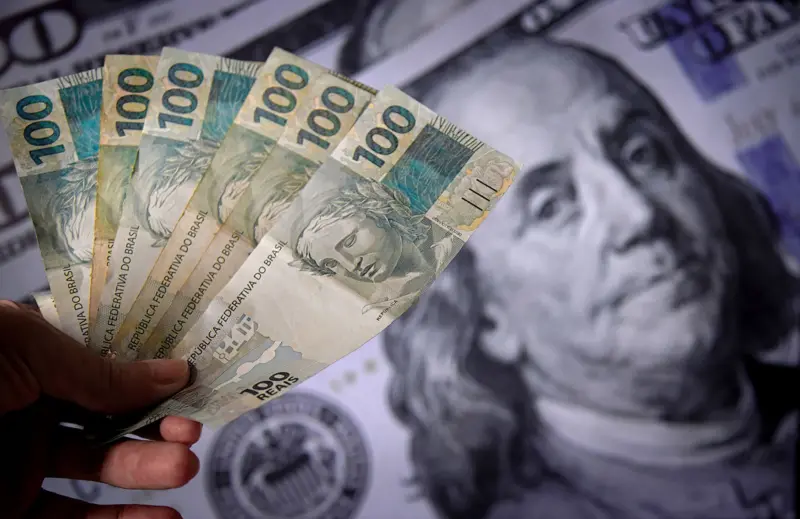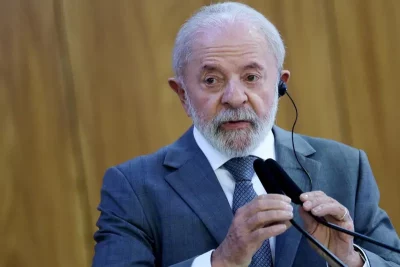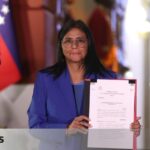
Trump cited an alleged US commercial deficit with Brazil; However, official data from the Brazilian government show surplus for the US
The Brazilian government is calculating the next steps of its response to US President Donald Trump’s announcement that Brazil products exported to the US market will be subjected to an additional 50% tax from August 1.
In an interview on Thursday night (10/07) to TV Nacional, TV Globo, President Luiz Inacio Lula da Silva (PT) said that the first stage of the reaction will be the formation of a group of Brazilian businessmen with large export volumes for the US, as producers of orange and steel juice, as well as Embraer.
The idea is to diagnose the consequences of increasing tariffs and seek solutions, such as the demand for new foreign markets.
In addition, Lula stated that Brazil will seek an assessment of the World Trade Organization (WTO) on the situation.
“From there, if there is no solution, we will come with reciprocity already from August 1, when he starts to tax Brazil,” the president told TV Globo.
After all, what is the law of reciprocity, quoted by Lula as a possible response to Trump?
Sanctioned by the Brazilian President in April, the Brazilian Economic Reciprocity Law authorizes the government to retaliate countries or blocks that impose commercial barriers to Brazilian products.
At the time of the entry into force, the law was presented as a “strategic action” in the face of the tariffs imposed on dozens of nations by the Trump administration in April.
Among the possible measures, Brazil could impose restrictions and surcharge on the importation of goods and services, suspend agreements or commercial obligations and, in exceptional cases, suspend intellectual property rights, such as patent recognition or royalties payment.
The law also determines that “diplomatic consultations will be carried out with a view to mitigating or nullifying the effects of measures and contracted.”
Although the law offers legal instruments for the executive branch, in coordination with the private sector, adopt “contracted” in response to “unilateral measures that negatively impact Brazilian international competitiveness”, a retaliation of Brazil can cause a climb in the trade war.
“The most obvious answer, retaliation, would come with Brazil by imposing reciprocal tariffs or similar to American products,” the Brazil-Eua Carlos Gustavo Poggio expert, Professor of International Relations at Berea College, in the American state of Kentucky, tells BBC News Brazil.
“But this would not be the best answer,” says Poggio.
Commenting on Brazil’s chances of measuring forces with the US, Poggio compares: “It’s David against Goliath.”
“The US is a much more important partner for Brazil than Brazil is for the US in terms of trade as a whole. So, the capacity Brazil has [de retaliar] It is very limited, ”he says.
‘Trump only listens to American entrepreneurs who eventually call him,’ says Professor Carlos Gustavo Poggio, suggesting that Brazil could try to mobilize parliamentarians and entrepreneurs in the US | EPA
In the letter addressed to Lula, in which he announced his intention to tax Brazilian exports, Trump warned that “if for any reason you decide to increase your rates, then whatever the number chosen to increase them, it will be added to the 50% we charge.”
According to Poggio, a pure and simple retaliation from the Brazilian government would only be a symbolic issue that would end up damaging Brazil as well.
“However, you can’t be totally unanswered [ao anúncio de Trump]”, Ponders.
Another way to respond, according to the analyst, would be to try to pressure the specific sectors more linked to Brazilian trade and seek contact with American civil society, such as parliamentarians and entrepreneurs – “and see if this can reach Trump.”
“Trump just listens to American businessmen who eventually call him and tell ‘this is hurting us,'” he notes.
Another option, suggests Poggio, would be to try some kind of regional pressure, joining other countries, such as Mexico.
‘Brazil is being sanctioned by the US, as is Iran, Venezuela or Russia’
The US is the second main destination of Brazilian total exports, behind China, and the main destination for Brazilian exports of manufactured products.
The new rate represents a significant increase over the 10% announced by the US on April 2.
Products such as steel, oil, aircraft, pulp, coffee, meat and orange juice are among the main Brazilian exports to the US, according to government data, and these sectors could be the most affected.
The most imported in US Brazil are non -electrical engines and machines, fuel oils and gross oil, aircraft and natural gas.
Brazil could redirect its products to other markets, such as China.
But while exports to China are focused on commodities, the US agenda is more diverse and higher value added.
Among the justifications for new tariffs, Trump cited an alleged US commercial deficit with Brazil. However, official data from the Brazilian government show surplus for the US.
In his note in response, Lula said that “the information is false in the case of the commercial relationship between Brazil and the United States, about the alleged American deficit.”
“The statistics of the US government itself prove a surplus of this country in the trade of goods and services with Brazil of around US $ 410 billion over the last 15 years,” says the note.
Trump’s justifications for the ad are not merely commercial. His letter cites a supposed persecution that former President Jair Bolsonaro (PL) was suffering in Brazil, where he is the target of criminal proceedings in the Supreme Federal Court (STF) on charges of leading an attempted coup.
 Law sanctioned by Lula in April authorizes the government to retaliate countries or blocks that impose commercial barriers to Brazilian products | Reuters
Law sanctioned by Lula in April authorizes the government to retaliate countries or blocks that impose commercial barriers to Brazilian products | Reuters
Trump’s letter also mentions STF decisions with “hundreds of secret and illegal censorship orders for US social media platforms, threatening them with millions of dollars in fines and expulsion from the Brazilian social media market.”
Trump’s decision was received with surprise in Brazil and the US. American economist Paul Krugman, winner of the Nobel Prize in Economics in 2008, said the letter “marks a new direction” of tariff policies described by him as “megalomaniacs.”
The main vehicles of the American press also reverberated the letter. The Washington Post has stated that the announcement shows how personal, not simply economical issues, guide the use of Trump’s commercial tariffs.
On Wednesday, the Ministry of Foreign Affairs twice convened the US embassy business in charge, Gabriel Escobar, to provide clarification.
The call is a serious measure in international relations and a demonstration of displeasure with the other nation.
Ambassador Maria Luisa Escorel, Secretary of North America and Europe of Itamaraty, reported that Brazil would return the letter, considered by her as offensive and containing untrue statements and factual errors.
Poggio, from Berea College, considers this one of the lowest points in 200 years of bilateral relations between Brazil and the USA and classifies the actions announced by Trump as a sanction to Brazil.
“The name given to economic coercive measures for political purposes is sanction,” he says.
“Brazil is being sanctioned by the US, as well as Iran, Venezuela or Russia. With the difference that Brazil is a democracy and is a historic ally from the US, a country -friendly country.”
Originally published by BBC News Brasil on 11/07/2025
By Alessandra Corrêa – Washington
Source: https://www.ocafezinho.com/2025/07/11/como-o-brasil-poderia-retaliar-os-eua-apos-tarifas-de-trump/

